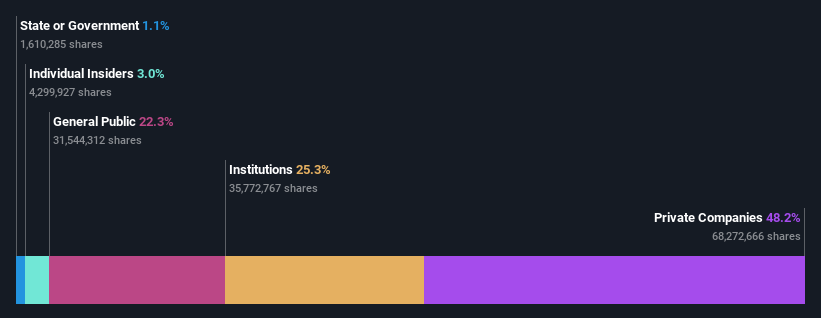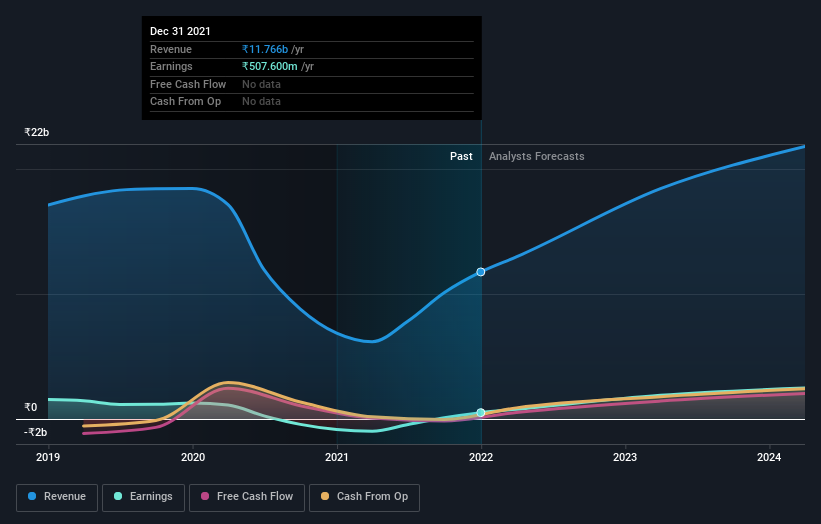Painful week for private companies invested in VIP Industries Limited (NSE:VIPIND) after 6.6% drop, institutions also suffered losses

A look at the shareholders of VIP Industries Limited (NSE:VIPIND) can tell us which group is most powerful. We can see that private companies own the lion's share in the company with 48% ownership. That is, the group stands to benefit the most if the stock rises (or lose the most if there is a downturn).
While institutions, who own 25% shares weren’t spared from last week’s ₹6.6b market cap drop, private companies as a group suffered the maximum losses
In the chart below, we zoom in on the different ownership groups of VIP Industries.
See our latest analysis for VIP Industries

What Does The Institutional Ownership Tell Us About VIP Industries?
Many institutions measure their performance against an index that approximates the local market. So they usually pay more attention to companies that are included in major indices.
As you can see, institutional investors have a fair amount of stake in VIP Industries. This suggests some credibility amongst professional investors. But we can't rely on that fact alone since institutions make bad investments sometimes, just like everyone does. If multiple institutions change their view on a stock at the same time, you could see the share price drop fast. It's therefore worth looking at VIP Industries' earnings history below. Of course, the future is what really matters.

VIP Industries is not owned by hedge funds. Looking at our data, we can see that the largest shareholder is DGP Securities Ltd with 27% of shares outstanding. In comparison, the second and third largest shareholders hold about 16% and 2.8% of the stock.
On looking further, we found that 51% of the shares are owned by the top 5 shareholders. In other words, these shareholders have a meaningful say in the decisions of the company.
Researching institutional ownership is a good way to gauge and filter a stock's expected performance. The same can be achieved by studying analyst sentiments. There are a reasonable number of analysts covering the stock, so it might be useful to find out their aggregate view on the future.
Insider Ownership Of VIP Industries
The definition of an insider can differ slightly between different countries, but members of the board of directors always count. The company management answer to the board and the latter should represent the interests of shareholders. Notably, sometimes top-level managers are on the board themselves.
I generally consider insider ownership to be a good thing. However, on some occasions it makes it more difficult for other shareholders to hold the board accountable for decisions.
We can report that insiders do own shares in VIP Industries Limited. It is a pretty big company, so it is generally a positive to see some potentially meaningful alignment. In this case, they own around ₹2.8b worth of shares (at current prices). Most would say this shows alignment of interests between shareholders and the board. Still, it might be worth checking if those insiders have been selling.
General Public Ownership
The general public-- including retail investors -- own 22% stake in the company, and hence can't easily be ignored. While this size of ownership may not be enough to sway a policy decision in their favour, they can still make a collective impact on company policies.
Private Company Ownership
We can see that Private Companies own 48%, of the shares on issue. It's hard to draw any conclusions from this fact alone, so its worth looking into who owns those private companies. Sometimes insiders or other related parties have an interest in shares in a public company through a separate private company.
Next Steps:
I find it very interesting to look at who exactly owns a company. But to truly gain insight, we need to consider other information, too. Case in point: We've spotted 2 warning signs for VIP Industries you should be aware of, and 1 of them is a bit concerning.
If you are like me, you may want to think about whether this company will grow or shrink. Luckily, you can check this free report showing analyst forecasts for its future.
NB: Figures in this article are calculated using data from the last twelve months, which refer to the 12-month period ending on the last date of the month the financial statement is dated. This may not be consistent with full year annual report figures.
New: Manage All Your Stock Portfolios in One Place
We've created the ultimate portfolio companion for stock investors, and it's free.
• Connect an unlimited number of Portfolios and see your total in one currency
• Be alerted to new Warning Signs or Risks via email or mobile
• Track the Fair Value of your stocks
Have feedback on this article? Concerned about the content? Get in touch with us directly. Alternatively, email editorial-team (at) simplywallst.com.
This article by Simply Wall St is general in nature. We provide commentary based on historical data and analyst forecasts only using an unbiased methodology and our articles are not intended to be financial advice. It does not constitute a recommendation to buy or sell any stock, and does not take account of your objectives, or your financial situation. We aim to bring you long-term focused analysis driven by fundamental data. Note that our analysis may not factor in the latest price-sensitive company announcements or qualitative material. Simply Wall St has no position in any stocks mentioned.
About NSEI:VIPIND
V.I.P. Industries
Manufactures and sells luggage, backpacks, and accessories in India.
Reasonable growth potential with mediocre balance sheet.
Similar Companies
Market Insights
Community Narratives




